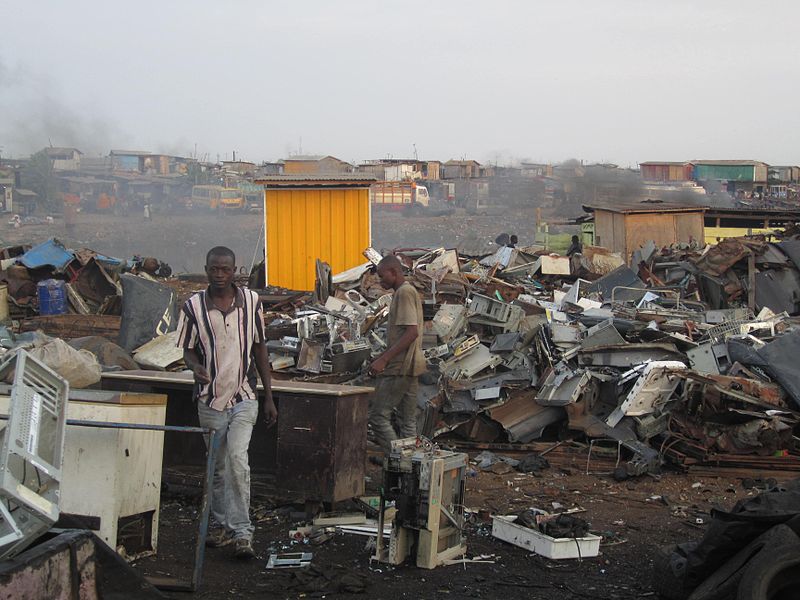The orange flesh of a papaya is like an oval gash in the landscape at Agbogbloshie, Ghana’s vast dumping site for electronic waste, where everything is smeared and stained with mucky hues of brown and sooty black. A woman kneels among the carcasses of discarded computer monitors, scooping the fruit’s flesh for workers hungry from a morning’s work scavenging to eat.
If the appliances at Agbogbloshie were not being dismantled – plucked of their tiny nuggets of copper and aluminium – some of them could almost be technology antiques. Old VHS players, cassette recorders, sewing machines, computers from the 1980s and every period since lie haphazardly on large mounds in the dump, which stretches as far as the eye can see.
- See photos of electronic waste dumping in Ghana here
“Electric waste comes here from all over the world – but especially from Europe,” says Karim (29) who, like almost all the scrap dealers at Agbogbloshie, originally comes from northern Ghana but has been salvaging, buying and selling at the dump for 10 years. “We get a lot of health problems here, but we manage, because we need the money.”
Last week, the UN’s “Solving the E-Waste Problem” initiative (Step), which was set up in 2007 to tackle the world’s growing crisis of electronic waste, warned that the global volume of such refuse is set to grow by 33% over the next four years. Much of it will be dumped in sites such as those in Agbogbloshie, increasing the risk of land contamination with lead, mercury, cadmium, arsenic and flame retardants.
Agbogbloshie seems chaotic, apocalyptic in places, but there is an order to the large, desolate, rubbish-strewn site. At one side, boys and young men gather in groups, picking their way through piles of old hard drives, untangling wires, and breaking up old air-conditioning units and even irons.
Abdoullaye (19) and a group of other teenage boys sit under makeshift iron shelters on the upturned cases of old PC monitors, working at a pile of e-waste with chisels and pliers and by hand.
The boys are surrounded by rows of rusty chest freezers, each one dangling a heavy padlock. Inside them, they store the fruits of their labour – piles of copper and aluminium – until the metal is bought by traders.

“I came here from Tamale five years ago,” said Abdoullaye, who wears turned-up blue jeans and a blue and white striped polo shirt smeared with dirt. “I make between two and five cedis (£0.50 to £1.30) each day, and each month I send 50 cedis (£13) back to my family in the north. I would like to go back home, but my family needs the money, so I stay. We get too many problems here – sometimes I have to go to the hospital. It’s not good for us.”
Deeper into the heart of Agbogbloshie, huge plumes of foul-smelling smoke rise up from three large fires, where the dismantled items are burned to remove traces of plastic, leaving the metal behind. The fumes are head-pounding, but the men, women and children weaving in and out of the fires seem oblivious. Goats sleep deeply beside the upturned remains of a tree, now strewn with plastic rubbish.
Roles are gender divided at Agbogbloshie. Women and girls wander the sprawling site, hawking peeled oranges, water sachets and cooked food. Many have tiny babies wrapped in cloth tied tightly to their backs, all inhaling the toxic fumes. There are special jobs for children, who trawl the site with magnets tied on to the end of a piece of string, picking up any tiny scraps of metal left behind in the dirt.
In the centre of the dump, a clearing has been turned into a football pitch, and two teams are in the midst of a match. Agbogbloshie is not just a site for trading, burning and dumping electrical waste; it’s also home to thousands of people, who carry on their lives and raise their children in the midst of its filth and fumes. There are shacks dotted throughout the central area of the dump. In the doorway of one, next to a large heap of discarded computer hard drives, is a large, grubby cloth poster of Thomas the Tank Engine.
Ghanaians have nicknamed Agbogbloshie “Sodom and Gomorrah,” after two condemned Biblical cities, but its residents take a less hostile view.
“This is not a good place to live. But we don’t want the people in Europe and all those places to stop sending the waste,” said Karim. “This is a business centre, and we are using the money we make here to help our families to have a better life.”
